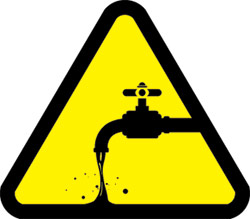
Are people who take antacids regularly more likely to get sick from bacteria in drinking water?
There are many reasons why people take antacids, normally for the temporary relief of heartburn. Initially, the use of antacids causes the body to produce more HCl (hydrochloric acid) that helps digest food. Parietal cells respond by making more acid. Eventually, the parietal cells get exhausted, so over the long term, antacids cause the parietal cells to make less HCl. This is just the start of antacids weakening your digestive system.

There are other problems associated with taking antacids. A recent study found that 47% of healthy people who had been using antacids for heartburn/reflux over long periods of time had erosion of the esophagus and 6% had Barrett's esophagus (a more serious condition). Antacids decrease your stomach's ability to digest protein by reducing the effectiveness of protease enzymes. Heavy use of antacids may create an overly alkaline environment resulting in imbalances of intestinal flora, stressing the kidneys, and setting the stage for possible urinary tract infections. The ability of the stomach to regulate its own acidity can be frustrating to people who take antacids like Tums or Maalox to counteract heartburn. When the alkaline chemicals neutralize stomach acid, a person's own G cells (the stomach cells that make the hormone called gastrin, which stimulates parietal cells to produce more acid) can turn rebellious and relight the fires of heartburn. The rebellious G cells sense the decline in stomach acid and secrete gastrin. The secretion of gastrin causes still more acid to be secreted, which defeats the antacid. A vicious cycle can thus occur when the need is felt to take more and more antacid.
In the end this process leaves the stomach and your digestive organs rather primed for ordinary bacteria in the water to take hold. The bacteria most readily able to wreck havoc in your weakened intestines is gastroenteritis. Gastroenteritis often called the "stomach flu," is a common and normally short-lived illness characterized by diarrhea and low-grade fever, cramps, nausea, and vomiting. Most people don't require medical attention, although infants, young children, and the elderly are at higher risk for more severe disease.
Some medications—especially antacids, or antibiotics, opiates, and anti-diarrhea drugs—create an environment conducive to the development of gastroenteritis. Long-term use of antacids and medications such as cimetidine (Tagamet) alter the acid environment of the stomach and colon, which normally provides a defense against many gastroenteritis-causing microorganisms. In addition, magnesium-containing antacids can actually cause diarrhea, mimicking gastroenteritis.
Specific ulcer drugs, like best-selling Zantac and Tagamet, seem to suppress symptoms without clearing up the problem. Most patients who take them relapse within two years. These drugs work by blocking the production of stomach acid. That may relieve your pain dramatically, but can be harmful in the long run. A certain level of acid secretion is necessary to digest proteins properly and to absorb vitamins and minerals. So if you're taking an ulcer drug, you may be setting the stage for mal absorption.
In the end, stomach acid also protects you by killing fungi, bacteria, and viruses that you cannot help ingesting along with your food. Without gastric acid's protection, you may be much more susceptible to food poisoning, parasites, and other gastrointestinal afflictions -- including ulcers.

